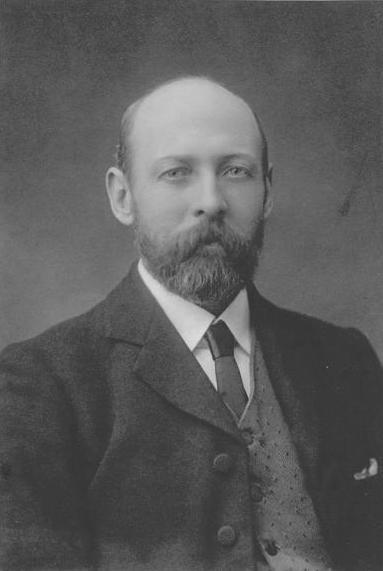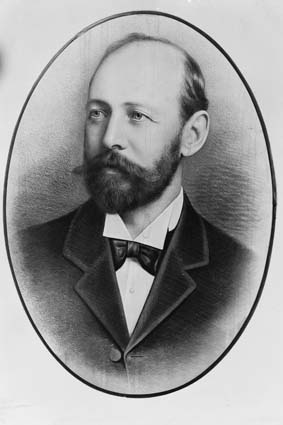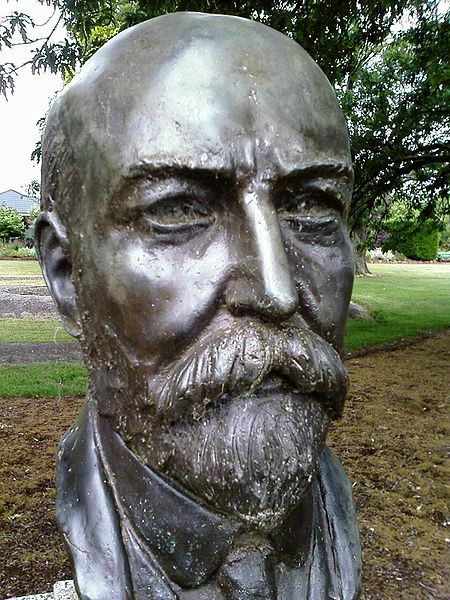<Back to Index>
- Mathematician Luigi Cremona, 1830
- Composer Pietro Antonio Stefano Mascagni, 1863
- 6th Prime Minister of Australia Joseph Cook, 1860
PAGE SPONSOR



Sir Joseph Cook, GCMG (7 December 1860 – 30 July 1947) was an Australian politician and the sixth Prime Minister of Australia. Born as Joseph Cooke and working in the coal mines of Silverdale, Staffordshire, during his early life, he emigrated to Lithgow, New South Wales, during the late 1880s, and became General Secretary of the Western Miners Association in 1887.
A
founding member of the Australian
Labor Party, Cook was elected to the New South Wales
Legislative Assembly as
Member for Hartley in 1891; the first Labor
seat in any Australian parliament. Cook later switched to the Free Trade Party,
and was a minister under George Reid from 1894 to 1899. During
Australia's first federal
election in 1901, Cook was elected unopposed to the federal seat
of Parramatta,
and served as the deputy to Reid, then Alfred Deakin following the creation of
the Commonwealth
Liberal Party from
Cook's and Deakin's parties. As leader of the Liberal Party, Cook
became Prime Minister following the 1913 elections,
but as he only had a one-seat majority in the lower house and a
minority in the upper house, he repeatedly sought the trigger for a double
dissolution. The outbreak of World War I during the September 1914
election led to
a Labor victory. Following a split in the Labor party in 1916, Cook
joined Billy Hughes' Nationalist
Party of Australia, and following the Nationalist victory in the 1917 election,
served as Minister for
the Navy, then Treasurer under Hughes. Cook retired from
Parliament in 1921, and was appointed
Australian High
Commissioner in London. During 1928 and 1929, he headed the Royal Commission into South Australia as
affected by Federation. He died in Sydney in 1947. Cook was
born as Joseph Cooke in Silverdale,
a small mining town near Newcastle-under-Lyme in Staffordshire, England.
He had no formal education and worked in the coal mines from the age of
nine. During his teens he embraced Primitive
Methodism, and marked his conversion by dropping the 'e' from
his surname. He married Mary Turner in 1885 and shortly after
emigrated to New South Wales. Cook
settled in Lithgow and
worked in the coal mines, becoming General Secretary of the Western
Miners Association in 1887. In 1888, he participated in demonstrations
against Chinese immigration. He was also active in the Single Tax
League and was a
founding member of the Australian
Labor Party in
1891. Cook was
elected to the New South Wales
Legislative Assembly as
MP for the coalfields seat of Hartley in
1891, in Labor's first big breakthrough in Australian politics. It was the first time Labor had
won a seat in any parliament in Australia. In
1894, however, Cook was the leader of the group who refused to accept
the Labor Party's decision to make all members sign a "pledge" to be
bound by decisions of the Parliamentary Labor Party (Caucus). He left the party and became a
follower of George Reid's Free Trade Party.
He was a minister in Reid's government from 1894 to 1899. When the
first federal Parliament was elected in 1901,
Cook was elected, unopposed by Labor, member for Parramatta,
a seat which then included the Lithgow area. He
became Reid's deputy, but did not hold office in Reid's 1904 - 05
ministry, mainly because Reid needed to offer portfolios to independent Protectionist members.
When Reid retired from the party leadership in 1908, Cook agreed to
merge the Anti-Socialist Party (the Free Trade Party was renamed prior
to the 1906 federal
election) with Alfred Deakin's
Protectionists, and became deputy leader of the new Commonwealth
Liberal Party. Cook
served as Defence Minister in
Deakin's 1909 - 1910 ministry, then succeeded Deakin as Liberal leader
when the government was defeated by Labor in the 1910 elections. He had
by this time become completely philosophically opposed to socialism. At the 1913 elections Cook
won a one-seat majority in the House of Representatives, while Labor
retained a majority in the Senate, and in doing so became the 6th Prime Minister
of Australia. Apparently unable to govern effectively without
control of the Senate, Cook decided to bring about a double
dissolution election
under section 57 of the Constitution of
Australia.
He introduced a bill abolishing preferential employment for trade union
members in the public service, a bill he knew the Senate would
repeatedly reject. He then sought and obtained a double dissolution of
the Parliament from the Governor General. Unfortunately
for Cook, World War I broke out in the middle of
the election campaign for the September 1914
election.
Fisher was able to remind the voters that it was Labor that had
favoured an independent Australian defence force, which the
conservatives had opposed. Cook was defeated and Fisher resumed office. In 1916,
the Labor government split when Fisher's successor, Billy Hughes,
tried to introduce conscription.
Cook agreed to become Hughes's deputy in the new Nationalist
Party, and became Minister for
the Navy in
Hughes's government. The Nationalists had huge victories in the 1917
and 1919 elections. Cook was part of the Australian delegation at the Paris Peace
Conference where he
defended the White Australia
Policy and
supported Australia's annexation of German New
Guinea. He was Treasurer (finance minister) 1920 - 21. Cook
resigned from Parliament in 1921 and was appointed Australian High
Commissioner in London, where he served until 1927. During 1928
and 1929, he headed the Royal Commission into South Australia as
affected by Federation. He died in Sydney in 1947, aged 86. Cook was
appointed to the Privy
Council on 16
July 1914. He was knighted in 1918 as
Knight Grand Cross of the Order of St
Michael and St George (GCMG). In 1972,
he was honoured on a postage stamp bearing his portrait issued
by Australia Post.